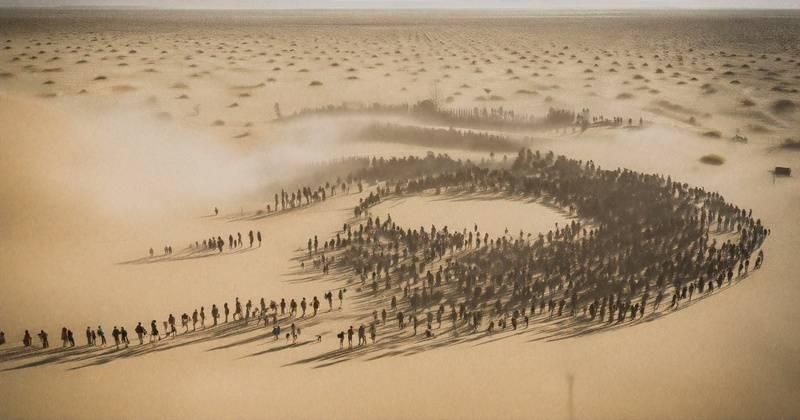“Fight in the way of Allah against those who fight you, but do not transgress. Indeed, Allah does not love those who transgress the limits.” (Al-Baqarah, 190)
Scholars of Islam state that this verse was the first to be revealed in Madinah concerning jihad. Accordingly, the Messenger of Allah [sallallahu alayhi wa sallam] initially fought only those who attacked him.
Permission to fight was given first — not as a command to wage war, but as authorization to defend against aggression. Later, jihad became an obligation, and the verses commanding it followed one another in succession. The verses that explicitly enjoined jihad are primarily found in Surah at-Tawbah.
In the second year after the Hijrah, during the month of Ramadan, the Messenger of Allah [sallallahu alayhi wa sallam] received news that a great caravan of Quraysh was returning from Syria under the leadership of Abu Sufyan ibn Harb. The caravan comprised a thousand camels and was guarded by thirty or forty fighters. Among them were notable figures such as Amr ibn al-As and Mahramah ibn Nawfal.
Reports also reached the Prophet that part of the caravan’s profit would be allocated to prepare for war against the Muslims. Upon this, the Messenger of Allah addressed the believers in Madinah, encouraging them to intercept the caravan:
“This is the Quraysh caravan, carrying their wealth. Go forth to seize it; it may be that Allah will grant it to you.”
Preparations were swiftly completed, and the small army set out from Madinah. They first camped in a field belonging to Sa’d ibn Abi Waqqas — a site chosen for its proximity to the city and for having water. It was customary for armies to gather outside the city before departure for inspection, duty assignments, and supply checks, obtaining any needed provisions from nearby towns.
At this camp, the Prophet [sallallahu alayhi wa sallam] sent back Zayd ibn Thabit [radiyallahu anh], who was only thirteen years old, deeming him too young for battle. Another youth, Umayr ibn Abi Waqqas [radiyallahu anh], wept in fear of being sent back as well. Seeing his zeal for jihad and martyrdom despite being only fifteen, the Prophet permitted him to stay.
At that time, the Prophet’s daughter Ruqayyah [radiyallahu anha], the wife of Uthman [radiyallahu anh], was gravely ill. The Messenger of Allah instructed Uthman to remain by her side, so he did not join the expedition to Badr.
Once the preparations were complete, the army advanced through the valleys of Aqeeq, Dhu’l-Hulayfah, and Rawha toward the expected route of the caravan. Since their target was the caravan, the preparations were light and swift to ensure timely interception.
The entire force possessed only two horses — one belonging to Zubayr ibn al-Awwam and the other to Miqdad ibn Amr [radiyallahu anhuma]. The Prophet placed Zubayr at the head of the right flank and Miqdad at the head of the left.
According to the historical sources, the army numbered around three hundred — many record it precisely as 313 fighters. They had seventy camels, which they rode in turns. The Messenger of Allah [sallallahu alayhi wa sallam] also shared a camel with Ali [radiyallahu anh] and Mirthad ibn Abi Mirthad. When his companions offered to give up their turn for him, he refused, saying, “You are no stronger than I am, and I am in no less need of reward than you.”
Two black banners led the army — one carried by Ali and the other by Sa’d ibn Mu’adh [radiyallahu anhuma]. The main standard, white in color, was in the hands of Mus’ab ibn Umayr [radiyallahu anh]. To guard the rear and monitor any threats, the Prophet appointed Qays ibn Abi Sa’sa’ah.
Meanwhile, the caravan had entered the lands of Hijaz. Abu Sufyan was uneasy. Ever since the Muslims had migrated to Madinah, he feared their pursuit. The Muslims, once restricted in Makkah, now had the freedom to organize, to move as a community, and to launch expeditions. They had already sent small detachments, shadowed trade caravans, and even launched a minor raid two months prior.
Knowing that this caravan’s profits would likely fund the Quraysh’s war efforts, Abu Sufyan feared a Muslim interception — and rightly so. Being a shrewd man, he sent scouts ahead, scanning every possible route, taking detours to avoid narrow passes and valleys where ambushes might lie in wait. His anxiety grew as he tried to keep his caravan safe — for he knew that the Muslims of Madinah were now a power not to be ignored.
The Messenger of Allah [sallallahu alayhi wa sallam] had also dispatched scouts to survey the surrounding area and locate the caravan routes through the valleys. They advanced as far as Badr and camped upon a hill overlooking the area, drawing water from the wells of Badr for themselves and their animals.
While they were at the well, they overheard two girls talking. The girls, who had come to fetch water, were discussing that the Quraysh caravan would soon pass through the town—within a day or two. They were preparing goods to sell to the merchants and were eagerly waiting for the caravan’s arrival.
The two scouts immediately set off to deliver the news to the Messenger of Allah.

